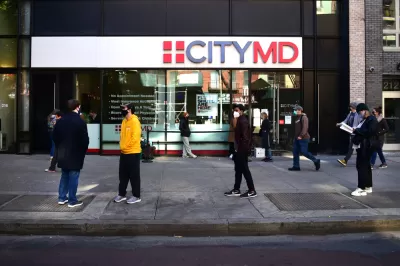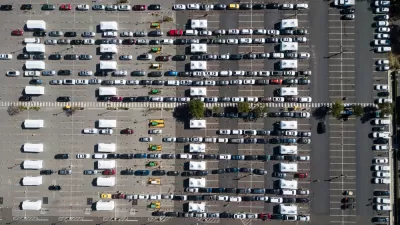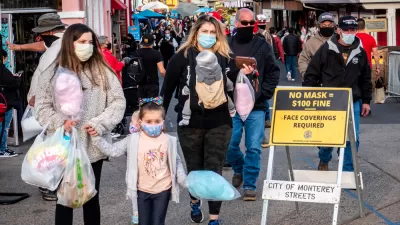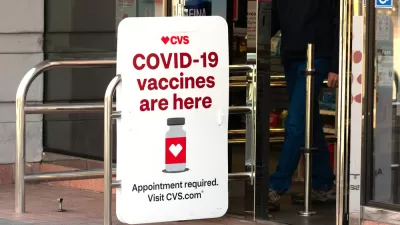Music critic Joel Rozen pens a unique perspective for Slate's "Coronavirus Diaries" on the Provincetown, Massachusetts cluster that prompted the CDC on July 27 to reverse its masking guidance for the fully vaccinated issued a month earlier.

This is Planetizen's second post on the pandemic that references another infectious viral disease, AIDS, and the role played by the Center for Disease Control and Prevention (CDC).
In June, U.S. District Judge Steven Merryday of the Middle District of Florida saw a connection between the two viral diseases when it came to placing restrictions on businesses in a lawsuit brought by Gov. Ron DeSantis in April over regulations imposed by the CDC to limit the spread of the novel coronavirus.
In his ruling on June 18, "Merryday called the CDC’s claim it has discretion to shut down a cruise because of COVID-19 transmission, 'breathtaking, unprecedented, and acutely and singularly authoritarian' and compared it to a hypothetical shutdown of sexual intercourse nationwide to prevent the spread of AIDS," reported Taylor Dolven for the Miami Herald.
Provincetown – the game-changer
Music critic Joel Rozen, a gay man living in New York City who received his second shot of the Moderna COVID-19 vaccine in April, also took aim at the CDC, but from an entirely different perspective.
"This year, my partner and I were among thousands from all over the country who descended on Provincetown in early July," begins Rozen in his riveting saga (source article) published in Slate's Coronavirus Diaries, a series of dispatches exploring how the coronavirus is affecting people’s lives.
It was about halfway through our weeklong stay when one vaccinated friend from New York City began to report not feeling well. Unable to stop coughing, he and his boyfriend drove to Outer Cape Health Services, where he tested positive for COVID and immediately fled the cape.
Days later [after returning to New York], I awoke with chills of my own, backaches, and crippling fatigue. When my sense of smell vanished later that afternoon—I dutifully circled around the apartment and whiffed each candle, without success—I turned up at CityMD and tested positive on a rapid test.
Rozen's story of contracting COVID as a fully vaccinated person is an important one because it sheds light on the role played by the CDC in the pandemic since effective vaccines have become accessible to every American, aged 12+, who wants them.
What did it mean, I asked the contact tracer who called me two days after I first presented symptoms, that I’d come down with COVID and my partner, also vaccinated, hadn’t? For months, the CDC had advised us that breakthrough cases among the vaccinated were rare events, that even if sickened by delta, we should be only mildly symptomatic—“mild,” of course, losing its meaning when you can’t taste your food for more than a week.
First criticism:
If I’d known the truth of how awful a breakthrough infection could be, I might have thought twice about hitting the cape in the first place.
Breakthrough infections that result in symptomatic illness, as opposed to being asymptomatic, continue to be downplayed by many public health experts and many in the media.' In fact, one Israeli study showed a connection to "long COVID".
Rozen continues:
The CDC’s misleading promises of safety aside, it wasn’t just my infection that felt like a betrayal. More than a few of my friends surprised me with gallows humor about the AIDS crisis and the outbreak, theorizing that it’d been too much sex, too many drugs—too much “fun”? —that we might blame for our predicament. Suddenly, my illness was being casually equated with promiscuity, as if personal behavior, and not poor public health guidance and quickly shifting science, was the culprit.
Behavior and CDC guidance
Behavior is indeed a critical aspect of coronavirus transmission, though not the behavior that Rozen and Judge Merryday reference. Mask wearing, social distancing, and avoiding large gatherings were three critical public health measures that CDC promoted in the pre-vaccine, pre-Delta days that were dropped on May 13, depending on vaccination status.
Data collected—thanks to the cooperation of gay community
Yet, it was the participation of gay men, particularly Michael Donnelly, a New York City data scientist, that helped reverse that guidance, as NPR reported on August 6.
"Following leads from his personal network, Donnelly documented over 50 breakthrough cases coming out of Provincetown, practically in real time, and shared it with the CDC as the outbreak was still unfolding," wrote health policy reporter Selena Simmons-Duffin for NPR.
Without Donnelly's effort, the agency would have probably detected the outbreak at some point, Demetre Daskalakis, a deputy incident manager for the CDC's COVID-19 Response, says, but "it wouldn't have been as rapturous an initiation of an investigation and response as we had."
The speed of the investigation — and the exceptional participation from the mostly gay men involved in the outbreak — helped the CDC learn new information about the delta variant. And it was that new information, in part, that prompted the agency to change its guidance for how vaccinated people should keep themselves safe at this stage of the pandemic — including a return to masking indoors.
Simmons-Duffin describes in detail the investigation that ultimately discovered the 469 COVID infections resulting from the Provincetown cluster, all being from the Delta variant, with three-quarters being among people fully vaccinated, i.e., breakthrough infections.
"Among five COVID-19 patients who were hospitalized, four were fully vaccinated; no deaths were reported," states CDC's report released on July 30.
Last words go to Daskalakis and Donnelly.
Gay men's relationship to public health has been "tempered by fire because of HIV," the CDC's Daskalakis says. "This is an awesome public health moment," he says. "It's a community that believes in science and public health stepping up to the plate."
Donnelly says he's proud of how his community responded to the investigators, and thankful that public health officials listened and wanted to understand.
"I was just the concentrator of this information," he says. It was the way the community responded, he says, that "allowed the CDC to learn something important about the new coronavirus, and — I really hope — protect some folks."
Related in Planetizen:
- Delta Variant's High Transmissibility Prompts CDC to Issue Masking Correction, August 2, 2021
- Coronavirus Litigation: CDC Loses Ability to Regulate Cruise Industry in Win for Florida Governor, July 27, 2021
- Pandemic Geography: Missouri Outbreak Driven by Delta Variant, June 21, 2021
- Will CDC's Revised Guidance for Fully Vaccinated People Prolong the Pandemic? May 17, 2021
FULL STORY: I Was Part of the July Fourth Provincetown “Breakthrough” COVID Cluster. It’s Been a Sobering Experience.

Montreal Mall to Become 6,000 Housing Units
Place Versailles will be transformed into a mixed-use complex over the next 25 years.

Planetizen Federal Action Tracker
A weekly monitor of how Trump’s orders and actions are impacting planners and planning in America.

DARTSpace Platform Streamlines Dallas TOD Application Process
The Dallas transit agency hopes a shorter permitting timeline will boost transit-oriented development around rail stations.

Study: 4% of Truckers Lack a Valid Commercial License
Over 56% of inspected trucks had other violations.

Chicago Judge Orders Thousands of Accessible Ped Signals
Only 3% of the city's crossing signals are currently accessible to blind pedestrians.

Philadelphia Swaps Car Lanes for Bikeways in Unanimous Vote
The project will transform one of the handful of streets responsible for 80% of the city’s major crashes.
Urban Design for Planners 1: Software Tools
This six-course series explores essential urban design concepts using open source software and equips planners with the tools they need to participate fully in the urban design process.
Planning for Universal Design
Learn the tools for implementing Universal Design in planning regulations.
City of Mt Shasta
City of Camden Redevelopment Agency
City of Astoria
Transportation Research & Education Center (TREC) at Portland State University
US High Speed Rail Association
City of Camden Redevelopment Agency
Municipality of Princeton (NJ)





























